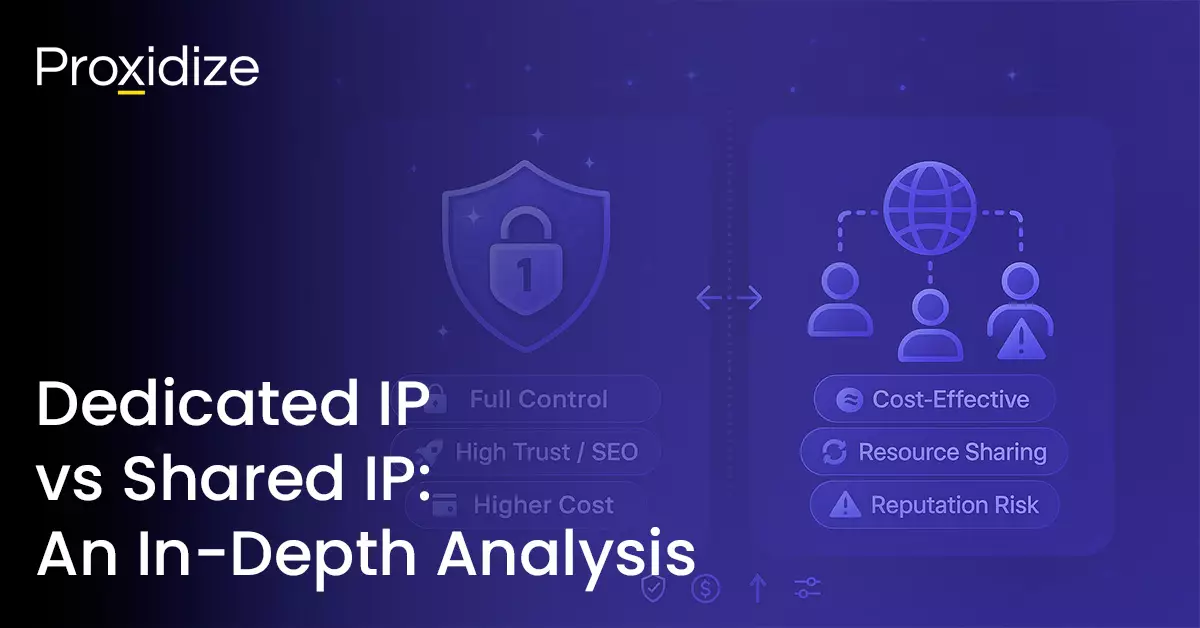The choice between a dedicated IP vs shared IP may seem simple and straightforward but they are quite different in how they work, what each is used for, and what makes them unique. For either individuals or businesses, choosing between a dedicated IP vs shared IP comes with knowing what they are, when and where a dedicated IP address is needed vs when a shared IP is useful, and keeping important factors in mind before making the decision. This article will provide an in-depth understanding of what a dedicated IP vs shared IP could mean to your personal projects or business at large.
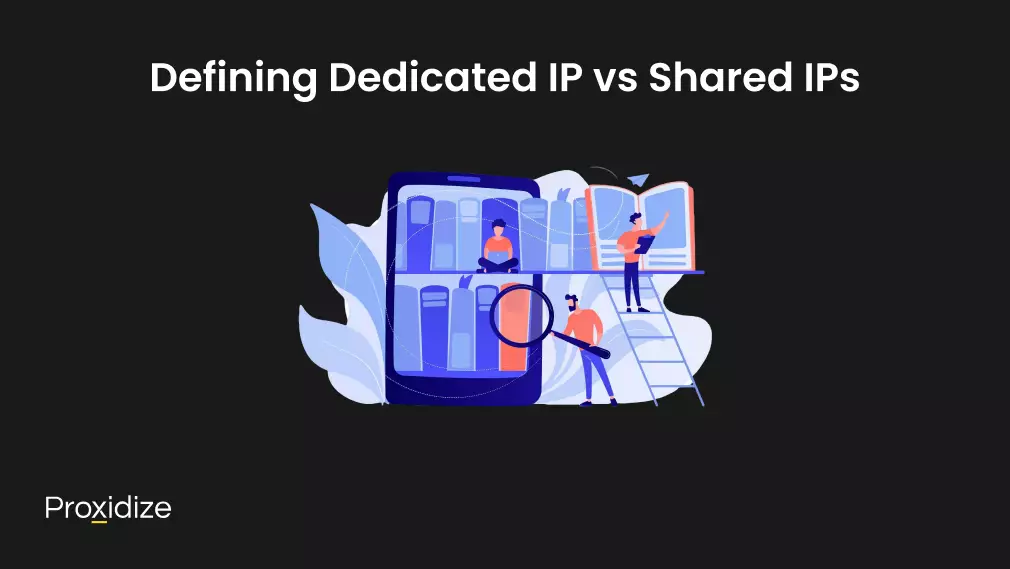
Defining Dedicated IP vs Shared IPs
A dedicated IP vs shared IP address could be explained as a simple surface-level definition. A dedicated IP address is one that belongs to you and you alone while a shared IP address is one that is shared amongst many people. However, there are many more things that make the distinction between the two valuable information. A dedicated IP address is a unique identifier that is assigned exclusively to one person, company, or device. Due to this inclusivity, whoever has a dedicated IP has control over online activities, improved security, and an online identity that is not influenced by another person.
Dedicated IPs tend to have advanced encryption protocols like AES-256 encryption which ensures secure access. The owner of a dedicated IP also has complete autonomy over how their IP is used. This comes in handy for a person or business that needs higher levels of trust such as when they are hosting e-commerce platforms, managing private servers, or sending a large volume of emails. Dedicated IPs are typically associated with premium hosting services, SSL certification installation, and enhanced reliability in accessing certain restricted networks or services. However, dedicated IPs are quite expensive but they make it for it with unparalleled stability for legitimate senders.
Shared IPs are a more economical solution that allows multiple users or organizations to use the same IP address. They provide a wide range of cost-effective options for personal users and smaller websites or companies that are just starting out. Choosing a shared IP address can reduce costs by distributing the expense of managing and maintaining an IP.
Shared IPs are commonly used in shared hosting environments where a website or application has lower traffic volumes and would not necessarily need the exclusivity attached to dedicated IPs. However, a shared IP address means that the reputation of the address is influenced by the actions of all the users with access to it.
If a bad actor engages in spamming or other similar malicious behaviors, it would negatively affect emails being delivered and could affect the accessibility of any website or websites associated with the IP. This could lead to the IP being blacklisted, which could make the IP worthless to some users.
Shared IPs often rely on a dynamic IP address which might lead to IP address conflicts. Regardless, shared IPs are still a practical choice for small businesses, blogs, and personal projects that need a more cost-efficient solution.
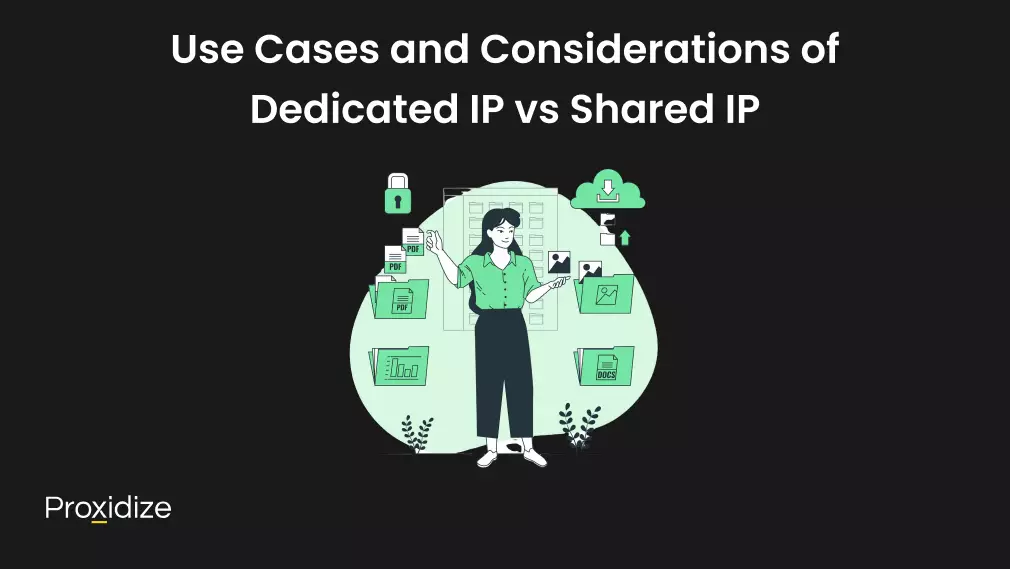
Use Cases and Considerations of Dedicated IP vs Shared IP
Picking between a dedicated IP vs shared IP comes down to a person or organization’s needs and their use case for the IP. Dedicated IPs are usually used for applications that prioritize security such as e-commerce platforms, financial institutions, or businesses with sensitive data.
Due to this exclusivity, dedicated IPs ensure that each user’s online activities will be isolated from each other. This reduces the risk of security breaches and strengthens the trust that users will have in the application or organization.
Smaller businesses or personal websites find it more advantageous and affordable to go for the resource-sharing benefits of shared IPs. Websites with moderate to low traffic, personal blogs, or small businesses opt for shared IPs to reduce hosting costs and leverage shared resources.
Despite that, sharing an IP with many users is risky in terms of security. If one user does something to compromise the IP’s score or reputation, it could lower the barrier for some websites to block it immediately.
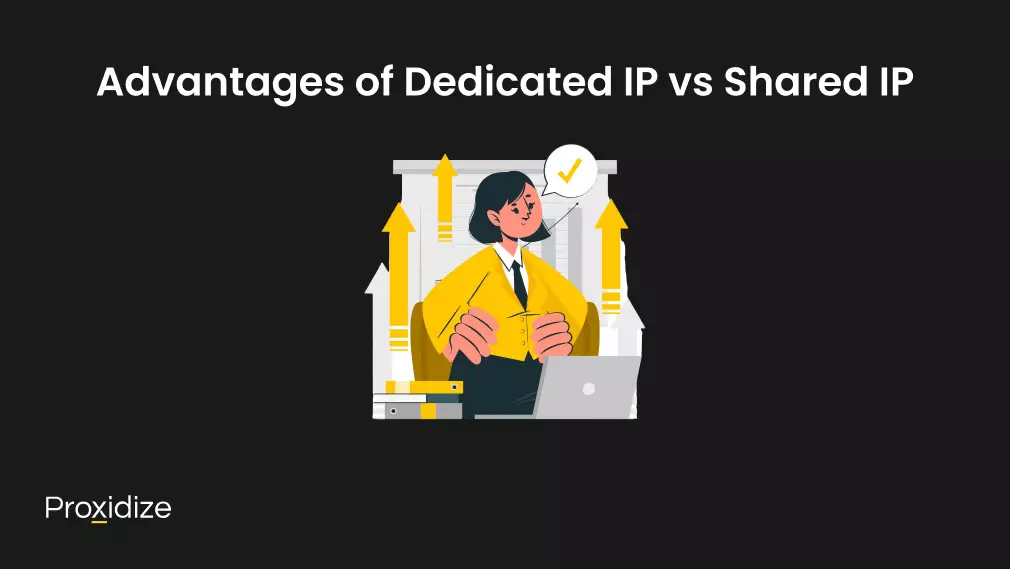
Advantages of Dedicated IP vs Shared IP
A dedicated IP has many advantages which include enhanced control over online activities, improved security, and they often implement SSL/TLS certificates for secure transactions. Websites that decide to use a dedicated IP can maintain their reputation, avoid blacklisting, and have greater flexibility when customizing their online presence. These advantages often lead users to choose dedicated IPs when faced with the decision of a dedicated IP vs shared IP.
However, a dedicated IP still comes with its own set of drawbacks. Primarily, they are more expensive than shared IPs, especially for businesses operating on a tight budget. The responsibility of managing the IP’s reputation and security will fall directly on the users.
This requires constant monitoring and performing proactive measures to maintain a positive reputation. This comes in many forms including following best practices when using the application or website, or utilizing a proxy server to maintain the quality of the IP in case of projects that require an act that might weaken the IP’s reputation.
Shared IPs are great as a cost-effective solution as they tend to cost a lot less than dedicated IPs. This allows users of shared IPs to optimize their resources and reduce operational costs. Shared IP hosting is usually used by small websites, blogs, or start-up companies that might not need the extra security and control that dedicated IPs offer. By using shared resources, users can benefit from lower costs and efficient resource allocation.
The drawbacks of shared IPs include potentially sharing IP reputation issues that other users on the same IP address. If one bad actor engages in malicious activities or violates online policies, it can impact the reputation of all the users who share that IP address. This shared risk This shared risk underscores the importance of choosing a reputable hosting provider and monitoring the collective reputation of shared IPs.
To truly compare the differences between a dedicated IP vs shared IP, we can look at the impact they have on SEO automation success rates. When you use a dedicated IP to build a consistent personas using an antidetect browser, you’re far less likely to get banned or blocked, for example. If you use low-quality shared proxies, it’s much more likely you’ll be banned on sight if you’re on several blacklists.
When it comes to email deliverability, dedicated IPs have more consistent and reliable delivery rates because the reputation of the IP is solely influenced by the sending behaviors of the user. This leads to higher inbox placement rates and improved engagements with high-volume email campaigns.
This is why a dedicated IP is an ideal choice for businesses that rely heavily on email marketing as maintaining a clean email list is critical for both shared and dedicated IPs to avoid spam. DMARC setup is also crucial here, as it helps authenticate emails and protect domains from spoofing, further enhancing deliverability and trust.
Shared IPs may be cost effective but they face challenges when maintaining consistent email deliverability rates because of the IP’s reputation. If someone using the shared IP engages in spamming or violates email server policies, it can result in deliverability issues for everyone using that IP. Whether you choose a dedicated IP vs shared IP, you must monitor the IP reputation to ensure that what you do aligns with the best standards.
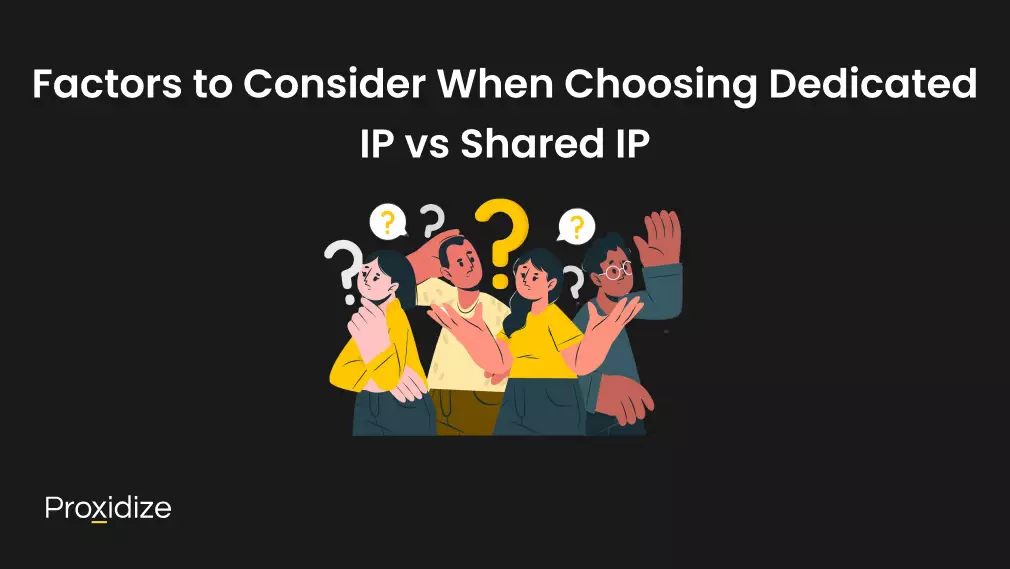
Factors to Consider When Choosing Dedicated IP vs Shared IP
When looking into which IP to get, here are a few factor to keep in mind when comparing a dedicated IP vs shared IP:
- Security Requirement: Assess the level of security you need for your service.
- Cost Considerations: Evaluate dedicated IP vs shared IP in terms of finances. If you have a strict budget, stick to the shared IP but if you see value in spending a little more money, get the dedicated IP.
- Scalability: Keep in mind the scale of your operation and choose the IP type that accommodates your growth plans.
- Reputation Management: Understand the implication of your IP reputation on your task. Consider SEO rankings and email deliverability and go for the IP type that supports your reputation management effort.
- User Control: Dictate the level of control you need over your online presence as this could be the determining factor between getting a dedicated IP vs shared IP.
- Consult with Hosting Providers: As a final step, look into hosting providers and understand the implications of choosing between a dedicated IP vs shared IP and see how these implications align with your online goals. You might have decided to go for a dedicated IP but the hosting provider might recognize your goals align closer to a shared IP.
Conclusion
Lately choosing whether to go with a dedicated IP or a shared IP has not been that easy as there are several factors to consider like your unique circumstances, the need and level of security, affordability, and scalability.
Each one of them comes with its own merits and demerits so you should make your choice in accordance with your specific use cases and requirements. Having a dedicated IP address is the best option for business enterprises since it allows them to carry out their online activities without interruptions thanks to the consistent access it guarantees. A shared IP address is probably more suited to casual users who don’t mind sacrificing greater anonymity for lower cost.
You as an individual or business can focus and engage fully by understanding the considerations around the dedicated IP vs shared IP arguments, particularly the security implications, performance, online presence, and overall costs to make the best decision for the intended use case.
While choosing dedicated IP addresses will satisfy the need for control and security, using shared IPs will lower these desired levels while at the same time being very cost-effective and scalable. Making a comparison of these two will assist you invest your resources wisely and save your time in the long run.
